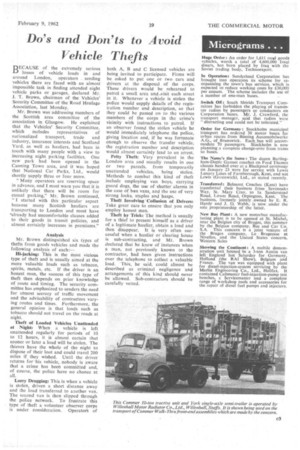Do's and Don'ts to Avoid Vehicle Thefts
Page 35

If you've noticed an error in this article please click here to report it so we can fix it.
BECAUSE of the extremely serious .1--/ losses of vehicle loads in and around London, operators . sending vehicles there are faced with an almost impossible task in finding attended night vehicle parks or garages, declared Mr. J. T. Brown, chairman of the Vehicles' Security Committee of the Road Haulage Association, last Monday.
Mr. Brown was addressing members of the Scottish area committee of the association in Glasgow. He explained that the Vehicles' Security Committee, which includes representatives of nationalized transport, trade and industry, insurance interests and Scotland Yard, as well as hauliers, had been in touch with many people with a view to increasing night parking facilities. One new park had been opened in the Canning Town area, and it was hoped that National Car Parks, Ltd., would shortly supply three or four more.
"Many operators are reserving space in advance, and I must warn you that it is unlikely that there will be room for casual parking," Mr. Brown continued, " I started with this particular aspect because many Scottish hauliers are transporting to London and must have *already had uncomfortable clauses added to their goods in transit policies, and almost certainly increases in premiums."
Analysis Mr. Brown distinguished six types of thefts from goods vehicles and made the following analysis of each:— Hi-jacking: This is the most vicious type of theft and is usually aimed at the more valuable loads such as tobacco, spirits, metals, etc. If the driver is an honest roan, the success of this type of theft then depends on prior knowledge of route and timing. The security committee has emphasized to senders the need for utmost secrecy of traffic movement and the advisability of contractors varying routes and times. Furthermore, the general opinion is that loads such as tobacco should not travel on the roads at night.
Theft of Loaded Vehicles Unattended at Night: When a vehicle is left unattended regularly for periods of 10 to 12 hours, it is almost certain that sooner or later a load will be stolen. The thieves have the whole of the night to dispose of their loot and could travel 200 miles if they wished. Until the driver returns for-his vehicle, nobody is aware that a crime has been committed and, of course, the police have no chance at all.
Lorry Dragging: This is when a vehicle is stolen, driven a short distance away and the load transferred to another van. The second van is then slipped through the police network. To frustrate this type of theft a volunteer observer corps is under consideration. Operators of
both A, B and C licensed vehicles are being invited to participate. Firms will be asked to put one or two cars and drivers at the disposal of the corps. These drivers would be rehearsed to patrol a small area and -visit each street in it. Whenever a vehicle is stolen the police would supply details of the registration number and . description, so that they could be passed on to the various members of the corps in the crime's vicinity with instructions to patrol. If an observer found the stolen vehicle he would immediately telephone the police, giving location and, if he was fortunate enough to observe the transfer vehicle, the registration number and description would almost certainly lead to an arrest.
Petty Theft: Very prevalent in the London area and usually results in one or two parcels, from temporarily unattended vehicles, being stolen. Methods to combat this kind of theft include employing van boys, carrying guard dogs, the use of shutter alarms in the case of box vans, and the use of very strong locks, staples and hasps.
Theft Involving Collusion of Drivers: Take great care to ensure that you only employ honest men.
Theft by Trick: The method is usually for a thief to present himself as a driver of a legitimate haulier, obtain a load and then disappear. It is very often successful when a haulier or clearing house is sub-contracting, and Mr. Brown declared that he knew of instances when a man, not previously known to the contractor, had been given instructions over the telephone to collect a valuable load. This, he said, could almost be described as criminal negligence and arrangements of this kind should never be allowed. Sub-contractors should be carefully vetted.
















































































































